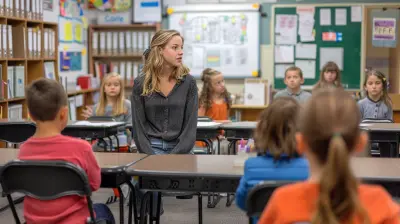Effective Assessment Methods in Differentiated Instruction
4 October 2025
Understanding what students know, how they think, and where they struggle is like trying to solve a mystery. Every student is unique—different strengths, different needs, different ways of processing information. That’s where differentiated instruction comes into play. But here’s the kicker: instruction is only half of the equation. Assessment plays a huge role too!
If we don’t use the right assessment methods, differentiated instruction is like flying blind. We might be teaching, but are we reaching? That’s why using effective assessment techniques specifically tailored for a differentiated classroom is so important.
In this post, we’re diving deep into the world of differentiated instruction and how you can assess students in a way that’s accurate, fair, and even fun. So, grab your favorite coffee, lean back, and let’s make assessment less of a chore and more of a tool to empower your teaching.
What Is Differentiated Instruction Anyway?
Before we jump into assessments, let’s break down what differentiated instruction (DI) really means.Imagine you’re cooking dinner for a group of friends. One’s vegetarian, someone else is gluten-free, and another loves spicy food. You wouldn’t serve them all the same dish, right? The same goes for teaching. DI is all about modifying the way we teach to support different learners in the same classroom.
You might differentiate by:
- Content: What the student learns
- Process: How they learn it
- Product: How they show what they’ve learned
- Learning Environment: The atmosphere or setup in which they learn
Easy enough, right?
But once you've tailored your lessons… how do you know if your students actually “got it”? That’s where assessment swoops in like a superhero.
The Assessment Struggle in a Differentiated Classroom
Here's the truth: traditional assessments like multiple-choice tests don’t always cut it in a DI setup. They’re like using a single measuring tape for objects of all shapes and sizes. It doesn’t tell the whole story.Effective assessment in differentiated instruction should be:
- Ongoing
- Flexible
- Student-centered
- Informative for both teacher and student
Let’s dig into the best methods that do just that.
1. Formative Assessment: The GPS of Learning
Think of formative assessments as your GPS while teaching—you don’t wait until you’re lost to recalibrate. These are day-to-day checks that guide your instruction in real time.Examples of Formative Assessments:
- Exit Tickets: Ask students one quick question related to the lesson before they leave the classroom.- Thumbs Up/Down: Get instant feedback during class.
- Quick Quizzes: Short, low-stakes quizzes help you spot misconceptions early.
- Think-Pair-Share: Students discuss their thoughts before sharing out loud—great for building confidence and gauging understanding.
These tools are golden because they let you adjust your teaching on the fly. And students? They feel heard and seen.
2. Summative Assessment: The Final Snapshot
Now, these are your typical end-of-unit or end-of-term tests. They provide a broad overview of student learning—but in a DI classroom, we need to get a little creative.How to Differentiate Summative Assessments:
- Offer Choices: Let students pick the format—presentation, essay, video, infographic. They still show their knowledge, just in a way that suits their strengths.- Tiered Assignments: Same topic, different levels of complexity based on the student’s readiness.
- Project-Based Learning: Students apply what they’ve learned in a real-world project. Think "Shark Tank-style" pitches for a business class.
Summative doesn’t have to mean “one-size-fits-all.” Give it a twist, and it becomes a great way for every student to shine.
3. Performance-Based Assessment: Show What You Know
Ever notice how some students ace a test but can’t explain the concept, while others struggle with tests but are brilliant when doing hands-on tasks?Performance-based assessments are your answer here. They ask students to apply skills and knowledge in authentic ways.
Types of Performance Assessments:
- Role-Playing: Great for history or literature—have students act out major events or characters.- Science Experiments: Design and perform an experiment to explore a concept.
- Debates or Speeches: Perfect for English or social studies.
- Portfolios: A collection of student work over time showing progress.
These types of assessments are meaningful, rich, and reveal deep learning.
4. Self and Peer Assessment: Reflect to Grow
Here’s something magical: when students reflect on their own work or assess peers, they start owning their learning. It builds metacognition (that’s a fancy word for “thinking about thinking”) and helps them become more independent learners.How to Incorporate:
- Rubrics: Give clear, student-friendly rubrics to guide their assessment.- Goal Setting: Let students set learning goals and track their progress.
- Reflection Journals: Encourage students to write about what they understood or struggled with.
It’s not about getting a grade—it’s about growing. And that’s a game-changer.
5. Diagnostic Assessments: Starting with a Map
Ever start a road trip without knowing where you’re going? Of course not. Diagnostic assessments are the “start here” markers of your instructional journey.Done at the beginning of a unit, these help you figure out students' prior knowledge, skills, and readiness levels.
Tools You Can Use:
- Pre-tests- KWL Charts (Know, Want to know, Learned)
- Surveys and questionnaires
- One-on-one interviews
Use this info to group kids, tailor content, and tweak your teaching strategies. It’s like Google Maps for your curriculum.
6. Technology-Enhanced Assessment: Let’s Get Digital
Let’s face it—we live in a tech-powered world. So why not let technology help with assessment?Cool Tools to Try:
- Kahoot! Fun quizzes with instant feedback.- Google Forms: Easy to create quizzes, surveys, and exit tickets.
- Flipgrid: Let students post video responses rather than writing.
- Padlet: Collaborative boards where students can post text, images, or links.
These tools not only save time—they give you amazing insight into student learning while keeping kids engaged.
7. Observation: The Silent Observer
Sometimes, the best assessments are the ones not written on paper. Watching your students can tell you a lot.- Who’s actively participating?
- Who’s struggling but not saying it?
- Who’s asking deeper questions?
Use checklists, anecdotal notes, or simply keep a journal. Observation is especially useful for kids who don’t test well but show their understanding in action.
8. Flexible Grouping and Assessment
One of the pillars of differentiated instruction is flexible grouping. That extends to assessments, too!- Work with guided groups: Meet with small groups for oral assessments or discussions.
- Assess individual progress: Don’t compare students to each other—compare them to themselves.
It’s all about measuring growth, not ranking performance.
9. Universal Design for Learning (UDL) and Assessment
UDL is like the Swiss army knife of education. It ensures that all students, regardless of ability, have equal opportunities to learn and show what they've learned.Key UDL Principles for Assessment:
- Multiple Means of Action and Expression: Let kids show what they know in different ways.- Multiple Means of Engagement: Keep assessments interesting and aligned with students’ interests.
- Multiple Means of Representation: Make sure assessment instructions and content are clear and accessible to everyone.
This framework helps you build assessments that are inclusive and supportive of diverse learners.
Tailoring Your Assessment Strategy
Okay, so we’ve covered a lot. What’s the takeaway?You don’t have to use every method listed here. Choose what works for your students. The beauty of differentiated assessment lies in its flexibility. Think of it as a toolbox—you grab the tool that fits the job.
Start small, experiment, and reflect. Ask your students what they prefer, and be open to trying new things. Because when assessment becomes personalized, it stops being a judgment. It starts being a conversation.
Final Thoughts
Effective assessment in differentiated instruction isn’t about adding more to your plate—it’s about adding better. Better understanding, better engagement, better outcomes. When we match assessment methods to the diverse needs of our students, we don’t just teach—we empower.So, let’s stop thinking of assessments as finish lines. Instead, think of them as pit stops on the road to mastery. And remember: every student’s journey is different, but with the right assessment tools, we can make sure each one reaches their destination successfully.
all images in this post were generated using AI tools
Category:
Differentiated InstructionAuthor:

Olivia Chapman
Discussion
rate this article
1 comments
Valeris McHugh
Embracing effective assessment methods in differentiated instruction opens the door to personalized learning journeys. Every student has unique strengths; let’s celebrate their diverse paths to success and empower them to thrive in their own way! Keep inspiring!
October 11, 2025 at 3:12 AM

Olivia Chapman
Thank you for your insightful comment! I wholeheartedly agree—embracing effective assessment methods truly allows us to celebrate and empower each student's unique learning journey. Let's continue to inspire and support diverse paths to success!


